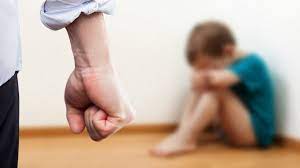*Disclaimer: This situation with my then father is legally finished. I am no longer in this household and I am now with my new, adoptive family. I am safe with my aunt, her husband, and her son.
It was 2015, Comic-Con. Phoenix, Arizona. I was 8 years old at the time. A young child, playing video games on my then adoptive father’s phone. It must have been late as I was groggy and ready for bed. At some point between walking up to my adoptive father and playing on his phone, I had lost it. Despite this moment being years ago, I still remember the fear that dwelled in my body. I didn’t want to get hurt. I walked down the halls and into the room he was in, crying about how I had lost his phone. Naturally, he was furious. I apologized, hoping it would help him feel better. It didn’t. Instead, he felt better when he slapped me hard across the face. I woke up to yelling. I had passed out, and my brain was foggy. 8-year-old me was weak and confused. Meanwhile, my adoptive father was yelling and screaming at me, still very angry. He was being held back by strangers, telling him to get away from me, but he was ready to hurt me again. Luckily, I am now in a new, loving family. However, these moments of pain and hitting left permanent damage to my psyche. This type of pain hasn’t only affected me, but also many children and adults around the world. Not only for its normalization in society but its psychological and social damage as well. Therefore, as a form of punishment, hitting and spanking should not be an option nor accepted.
The first question to ask when approaching this subject is why people even hit their kids. While the answer might seem obvious, parents hit kids to control and gain respect, the answer is much more complex than that. One of the bigger reasons as to why people hit their kids and continue to hit their children even in the modern-day would be the generational acceptance of the idea. While hitting and physical abuse to children is slowly changing and becoming less and less prominent in every generation, it is obvious that the farther back in time you go, the bigger and more prominent it is. Older generations showcased hitting and abuse even in school. Which is now illegal in the current day. Every generation grows up being told by their parents and others around them that this behavior is normal and is supposed to happen. Only recently, with psychological help being more common and socially normalized, have people started to recognize that hitting is, in fact, not normal and can leave permanent mental damage. Unprepared and improper parents are also the main inflictor of this abuse. Having a kid is expensive, difficult, and full of surprises. When difficult situations arise, is it humane to be frustrated, confused, and hot-headed? Parents are often given very little training for troubled or frustrating children. So when faced with improper training, knowledge, or help while taking care of a difficult child, a simple or ‘easy’ fix may be to slap a kid on the butt to quickly fix the issue and move on.
While people often think that hitting a child is an easy, quick fix, it is also important to know that this parental behavior will cause damage to the child’s long-term mental behavior and the parent-child relationship. Parent-child relationships are said to be sturdy and unbreakable but, in reality, they can easily crumble. Especially in the early development of children. The younger your child is when you hit them, the worse it is.
Children have no moral guide nor an idea of basic knowledge. Keeping this in mind, a child has a higher chance of doing something immature or dangerous. A child, if they have a close relationship with their parents, will seek them out when they are hurt or in danger. However, if a child fears their parents, then they will avoid telling their parents or guardian. A reason why parents and guardians may attempt to hurt their children is to try and gain respect. Generations before have thought that hurting, hitting, and spanking a child will bring respect. This ‘respect’ commonly gets confused with fear. Hitting your child brings fear instead of actively bringing respect. While both feelings are similar, they can destroy relationships and a child’s sense of comfort and safety with their parents. Hitting a child can also bring anxiety and stress to a child. If this stress and anxiety were to develop it could cause performance issues in daily life, even permanent mental damage. Taking form in an anxiety disorder or, in some extreme cases, P.T.S.D. (Posttraumatic stress disorder)
Finally, if you don’t hit your kids, what other punishments are out there? While most punishments may come off as soft or difficult to use, especially with difficult or unresponsive children, it is important to look at everything you can do before resorting to something as negative as hitting. A good example of gentle parenting, or parenting that doesn’t include hitting, would be my younger brother, Merlin. He is a 6-year-old handful for my parents. A young, bright child who will at times say or do something disruptive or dangerous. When Merlin acts this way or makes these choices my parents do not hit or harm, instead they try other methods of teaching. Sometimes avoiding punishment as a whole. Depending on the situation, they will sometimes sit down with him and tell him not to do it. This is something most parents do, but they often miss one crucial step: Explaining why you should or shouldn’t do something.
Often I see parents telling their kid to stop, and when the child asks why or lacks understanding the parent will give the excuse, “Because I said so!” While this is an easy response, it can cause the child to not care for the reason to stop and will continue to repeat the action they were told to stop. When you explain something to a child, it not only communicates the issue for future reference but can bring more information as to why or why not a child should do something. It teaches them respect for the parent and the issue. While this solution doesn’t work for every child, if it’s repeated during early development it can make childhood easier and create a comfortable environment.
In conclusion, while hitting a child may seem easy, cooperative, and effective, it can cause permanent damage to the child and the relationship between the parent and child. It is important to do your research on solutions to issues, and recognize that while parenting is hard, the shortcuts aren’t the best option. At times it is better to go the long way to avoid inflicting long-lasting harm to your child.




